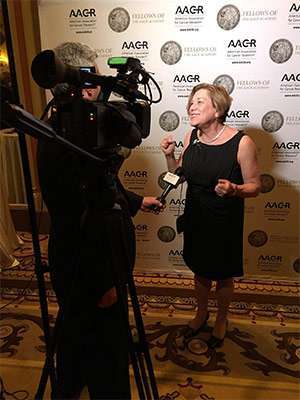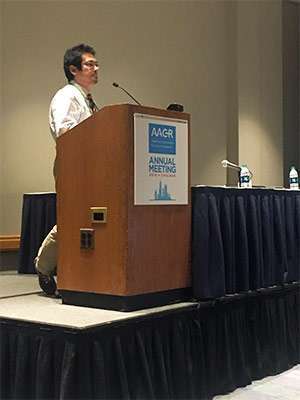
Attendees at the AACR Annual Meeting’s opening plenary session. Photo by © AACR/Todd Buchanan 2018
The theme for this year’s American Association for Cancer Research (AACR) Annual Meeting, which took place earlier this week in Chicago, was, “Driving Innovative Cancer Science to Patient Care.” An estimated 21,600 cancer researchers, doctors, patients and advocates, representing 71 countries across the globe, were in attendance to discuss the latest scientific findings and how they can be applied to improve outcomes for cancer patients.

PanCAN’s chief science officer, Lynn Matrisian, PhD, MBA, is interviewed at an elite Fellows of the AACR Academy event.
“I’ve attended AACR annual meetings throughout my entire academic and Pancreatic Cancer Action Network careers,” said Lynn Matrisian, PhD, MBA, chief science officer at PanCAN, who is herself a past president of the AACR. “And every year, I find myself inspired all over again at the number of people dedicated to fighting cancer and the caliber of research taking place.”
She continued, “The energy and momentum this year felt even more intense than usual – efforts in fields like precision medicine, targeted therapy and immunotherapy are really making a difference in extending and improving the lives of people faced with cancer.”
In addition to Matrisian, other members of PanCAN’s scientific and medical affairs team attended the meeting, which allowed them to learn from expert speakers, engage in meaningful discussions and network with colleagues new and old.

Grantee Kazuki Sugahara, MD, PhD, outlines his PanCAN-funded project at the grantee discussion session.
A highlight was the PanCAN-AACR Grantee Discussion session, which featured presentations, questions and answers, and discussion around leading-edge projects conducted by research grant recipients. The treatment-focused topics ranged from harnessing the immune system to recognize and attack the cancer cells to taking advantage of metabolic and cell signaling alterations to selectively kill pancreatic cancer cells.
“The grantee session was excellent!” Matrisian said. “We had robust audience participation, and the speakers gave very compelling overviews of their PanCAN-funded projects. It’s a great opportunity to showcase the work being conducted through our highly competitive research grants program and for the investigators to get feedback from leaders in the field.”
One of the biggest news stories to come out of this year’s AACR meeting was around lung cancer – researchers found that treating certain lung cancer patients with a combination of chemotherapy and a new drug called Keytruda led to a significant increase in survival, compared to chemotherapy alone. Keytruda is an immunotherapy treatment that is particularly effective in patients whose tumors exhibit specific molecular features.
Clinical trials are underway to determine whether pancreatic cancer patients will respond to Keytruda in combination with chemotherapy and/or radiation therapy, also. Contact PanCAN Patient Services for any questions about pancreatic cancer treatment options, including a personalized clinical trials search.
At @AACR‘s annual meeting, results of a #clinicaltrial testing #Keytruda in combination w/#chemotherapy in non-small cell #lungcancer patients were announced. Here are 5 important things to know about the drug: https://t.co/12ZizF86DM #PANCaware #AACR18
— PanCAN (@PanCAN) April 16, 2018
“The cool part about the Keytruda story is that it’s based on rigorous scientific data to ascertain how the drug stimulates the immune system and which patients are most likely to respond,” Matrisian noted. “We encourage pancreatic cancer patients to undergo molecular profiling, like offered through our Know Your Tumor® precision medicine service, to determine their tumor’s biological characteristics and whether certain treatments may be best for them.”
Matrisian added, “It’s so invigorating to be surrounded by so many like-minded people at meetings like the AACR annual meeting – bright and motivated scientists who want to make discoveries to benefit cancer patients. It fills me with hope for the future of cancer research and treatment.”














